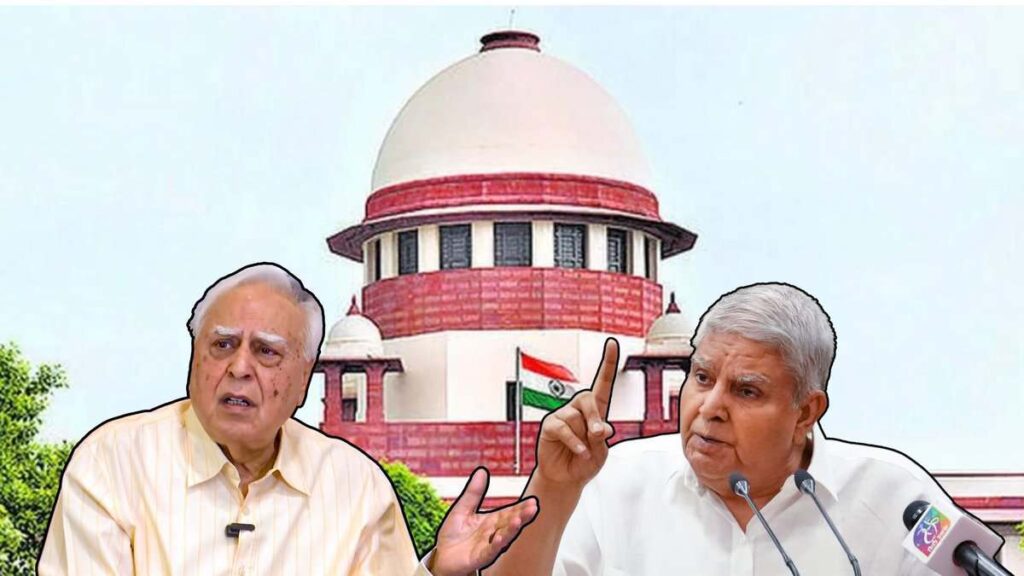By P. Sudhir
BJP leaders and the Vice President of India, Jagdeep Dhankhar, have launched vicious attacks on the Supreme Court. These attacks have come in the wake of the Supreme Court judgment on the Tamil Nadu Governor’s unconstitutional role in withholding bills passed by the state legislature and subsequently the CJI-headed bench giving an interim order on the Waqf Amendment Act.
Vice President Dhankhar has accused judges of becoming a “super parliament” with no accountability “because the law of the land does not apply to them”. He has also termed Article 142 of the Constitution, which gives special powers to the Court to render complete justice as “a nuclear missile against democratic forces”.
The BJP MP, Nishikant Dubey, was more vituperative and targeted the Chief Justice of India, Sanjiv Khanna, as responsible for “all civil wars in the country”. He further stated that if the Supreme Court makes the laws, then Parliament should be shut down.
What Dhankhar and company wants is that the judiciary should be subservient to Parliament. This goes against the Constitutional scheme. The higher judiciary has the power to review any legislation passed by the legislature to see if it is consistent with the Constitution. Even Constitutional amendments adopted can be reviewed by the Supreme Court to see if they are within the framework of the “basic structure”.
What has roused the ire of the BJP and its partisan supporters like the vice president is the historic judgment delivered by a two-member bench of the Supreme Court, which has held the actions of the Tamil Nadu Governor, R N Ravi, of first withholding assent to ten legislations passed by the state assembly and when these were re-adopted by the state legislature, instead of giving assent to them as per the provision of the Constitution, the governor then referred it to the president. This step was declared by the Court to be erroneous in law and illegal.
The Court further invoked Article 142 to deem that these ten Bills have been given assent to become laws. In this matter, the Court had correctly intervened to set right the governor’s unconstitutional action. For the BJP, which is using governors as a tool to interfere and obstruct the functioning of non-BJP state governments and legislatures, this amounts to the Supreme Court acting above the executive and Parliament. It is this authoritarian approach of the BJP-led government at the centre, which has now been successfully challenged in the Supreme Court.
In the case of the Waqf Amendment Bill, the three-member bench headed by Chief Justice Sanjiv Khanna has, at the outset itself, questioned certain features of the Act which transgresses the rights given under the Constitution for a religious group or minority. The Court noted the egregious provision that does away with the concept of “Waqf-by-use”. The Court pointed out that by this, with one stroke, tens of thousands of Waqf properties will have no locus standi if the Act comes into force. Secondly, the Court questioned how non-Muslims could be appointed to Waqf Boards and asked whether Muslims would be appointed to temple trusts and boards? Thirdly, the role of the Collector in deciding disputes raised on Waqf properties was also questioned.
In order to stave off an interim stay on these clauses, the Solicitor General went on record in the next hearing that the government would not change the character of Waqf-by-use properties in any manner till the Court’s final decision. He also said no appointments would be made on Waqf boards. Both these statements were taken on record in the order passed by the Supreme Court. The next hearing of the Court will be on May 5.
It is this stance of the Supreme Court on the Waqf Amendment Act that has infuriated the bigoted BJP leaders like Nishikant Dubey. Their remarks have to be seen as threats and intimidation of the higher judiciary. The Supreme Court Bar Association has condemned these remarks of Dubey and called it defamatory of the Chief Justice. It has requested the Attorney General to give consent for initiating contempt proceedings against Dubey.
In its authoritarian drive to bring all constitutional institutions under its control, the Modi government has not spared the Supreme Court too. However, despite all the efforts made, it has not captured the higher judiciary and made it totally subservient to it.
In the recent period, the Supreme Court has given judgments defending the rights of individuals who are being targeted by the central agencies, including the grant of bail. This coupled with the judgment protecting the rights of state legislatures and curbing governors’ misuse of powers; and the indications that the Court will not go along with the trampling upon the rights of Muslims with regard to Waqf properties – have become the occasion for another onslaught on the higher judiciary. It is time for all democratic sections to come together and unitedly defend the independence of judiciary and demand “Hands off the Supreme Court”. (IPA Service)

 Vietnam Shows The Way Of Trade Diplomacy Amidst Global Tariffs War
Vietnam Shows The Way Of Trade Diplomacy Amidst Global Tariffs War 